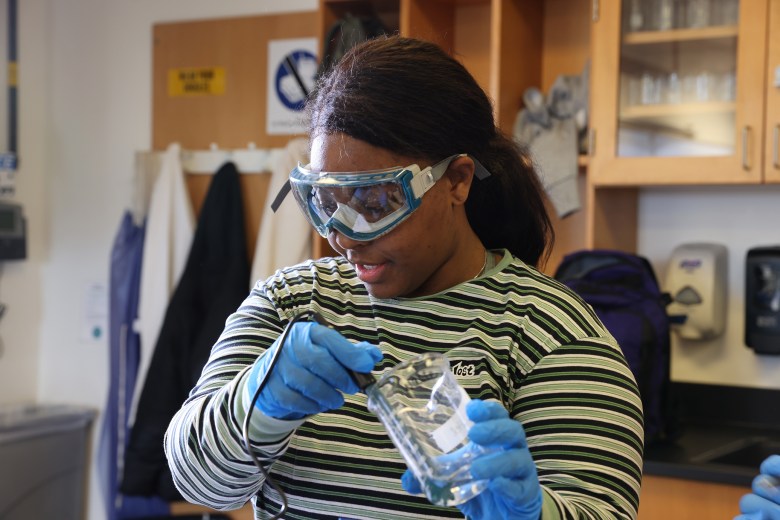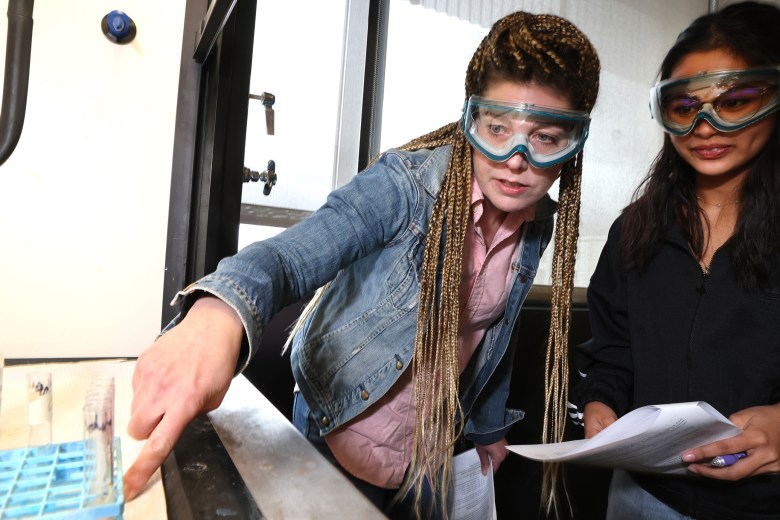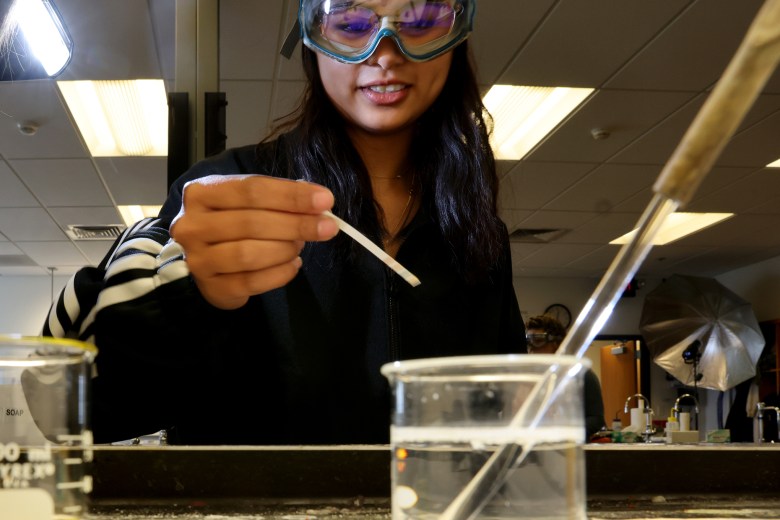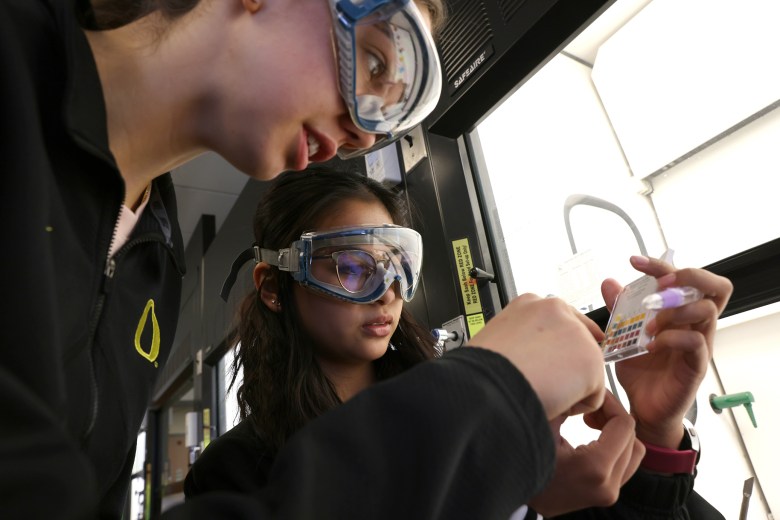EVERETT, Wa. – Terrica Purvis squinted through goggles as her hands carefully guided a pipette full of indigo-tinted fluid into clear glass test tubes.






It was the last chemistry lab of the winter quarter at Everett Community College, and Purvis was working through the steps of what chemistry faculty member Valerie Mosser jokingly refers to as the “post-apocalypse survival” lab — an experiment using boiled red cabbage water to test the acidity of common household chemicals.
Purvis is in her first year of study for an associate degree in nursing at Everett Community College. The 27-year-old is also one of more than 6,000 Washington community and technical college students enrolled in the state’s Integrated Basic Education and Skills Training (I-BEST) program.

Students who need extra help in subjects such as algebra struggle to learn if the content is taught in an abstract, isolated manner, educators say. That’s why I-BEST programs feature two teachers in the classroom: one provides job training and the other teaches basic skills in reading, math or English language.
For Purvis, who hasn’t been in school for nearly a decade, this class meant getting extra math help right when she needed it: during a chemistry class.
Saving the College Dream
This story is part of Saving the College Dream, a collaboration between AL.com, The Associated Press, The Christian Science Monitor, The Dallas Morning News, The Hechinger Report, The Post and Courier in Charleston, South Carolina, and The Seattle Times, with support from the Solutions Journalism Network.
Statewide data shows students in the program graduate at a higher rate than those enrolled in traditional adult basic education.
Among students who started college from 2015 to 2018, an average of 52 percent enrolled in I-BEST classes earned a degree or certificate within four years compared to 38 percent of students who did so while enrolled in traditional adult basic education coursework, according to the Washington State Board for Community and Technical Colleges.
The program is so successful that 12 states have implemented or are in the process of implementing an I-BEST model at one or more education institutions.
Related: More than a third of community college students have vanished
In the lab, instructor Mosser bounced between pairs of students, fielding questions about pH measurements and telling them they’ll never know when the skills they’re learning will come in handy.
Each time she gave a lecture or held a lab, she was joined by co-instructor Candace Ronhaar, who works as a tutor and extra math support instructor for students.
In one session, Ronhaar lifted a marker to the whiteboard and drew a little heart. She wrote the word “mole” beside it and explained it is a unit of measurement equivalent to the amount of atoms contained in 12 grams of carbon-12.

She guided students through practice problems, calculating the molar mass of chemical compounds.
All six students in Chemistry 121 were also taking an entry-level statistics class, and Ronhaar was co-instructor for both courses. Mosser said Ronhaar’s presence was the most valuable part of the I-BEST model.
“I’m an assessment instructor,” Mosser said. “She’s just a helping instructor. In the minds of students, the difference is incalculable. They have a different relationship with her. They’re more willing to go to her, because she doesn’t grade them.”
Purvis, who calls herself a strong student, said chemistry was the first class she ever took that “humbled” her. She doesn’t think she would have passed without I-BEST. Students fresh out of high school had an easier time remembering chemistry and math, Purvis said, but she hadn’t studied those subjects for 10 years.
“We have used Sputnik-era mathematics, abstractly taught, to sort by race and class. Math has revolutionized every industry.”
Davis Jenkins, senior research associate with the Community College Research Center at Teachers College, Columbia University
“They couldn’t have picked a better second instructor,” Purvis said of Ronhaar. “I loved it. We went to her office hours all the time. She even joked around with us.”
After high school, Purvis spent six years as a cook in the Navy, and took classes at a couple other colleges. Last year, she was medically discharged and returned to school at Everett Community College full-time.
After attaining her associate degree in nursing, she plans to transfer to University of Washington Bothell to earn a Bachelor of Science in Nursing degree, and hopes to work in labor and delivery at a hospital.
Related: Trade programs – unlike other areas of higher education – are in hot demand
Helping more students graduate from nursing school by giving them just-in-time math help has a larger societal benefit. From 2020 to 2021, the number of working RNs in the United States decreased by more than 100,000 — the highest drop in four decades.
An estimated 200,000 jobs for registered nurses are expected to open each year in the U.S. between now and 2031, the Bureau of Labor Statistics reported in 2021. That means the job prospects for students like Purvis are promising.
Not only has I-BEST increased graduation rates, its students turn in solid academic performances. Over the past three years, 90 percent of students passed their I-BEST courses with a grade of C-minus or better.
The program is so successful that 12 states have implemented or are in the process of implementing an I-BEST model at one or more education institutions.
The program is growing, and serves a diverse group of students. I-BEST enrollment in the state has increased by more than 20 percent the past five years. Forty-six percent of students enrolled in I-BEST are students of color, 55 percent are women and 39 percent have dependents.
I-BEST opens the door to federal financial aid by making it available to students who didn’t graduate from high school. Under financial aid rules, students must either have a high school diploma or prove their “ability to benefit” from aid by being enrolled in a qualifying program, such as I-BEST, where they learn basic skills as part of their career pathway.
Along with nursing, other high-demand I-BEST job pathways include aeronautics, manufacturing and information technologies.
At Bellevue College, I-BEST students enrolled in Business 101 meet with instructor Eric Nacke for an adult basic education class on a separate day. Nacke teaches English in the context of the business world.
Student Forouzan Barfibafeghi moved from Iran to the U.S. in 2020. She holds a bachelor’s degree in business from Islamic Azad University in Tehran, where she graduated in 1999. Coming back to school in the U.S., Barfibafeghi said her biggest challenge has been learning English.
She said Nacke’s classes have not only helped her grow her English skills, they have given her a sense of community.

“Besides teaching just the basic skills to get college-level English,” Barfibafeghi said, “This is also a space where we can meet. We have created a strong bond between us. That is one of the highlights for me.”
Barfibafeghi said that although the courses have been held exclusively online via Zoom, she has befriended many other students in the class. When she graduates with her associate degree in business, she hopes to find work in the insurance industry.
In the 2021-2022 academic year, 85 percent of students enrolled in I-BEST classes at Bellevue College were women and 58 percent were first-generation college students.
Related: The new labor market: No bachelor’s required?
I-BEST was launched as a state pilot program almost 20 years ago, when data began to show that students needed vocational training to improve their job prospects.
The program was to change the remediation model in most community colleges, where students who don’t do well on placement tests must take pre-college classes in their weak subject — essentially a repeat of high school.
Research shows that results of standardized placement tests often correlate with race and socioeconomic status.
The way high school math is taught has not changed much since the 1970s, despite changes in the job market and the way the subject is applied therein, said Davis Jenkins, senior research associate with the Community College Research Center at Teachers College, Columbia University.

“The only purpose of this is to sort by race and class,” Jenkins said. “And the only reason is people like me – I’m middle class – have known how to work the system. This is bigger than I-BEST. … We have used Sputnik-era mathematics, abstractly taught, to sort by race and class. Math has revolutionized every industry.”
In Washington, because I-BEST uses a mix of state, federal and other grant funds, the state doesn’t know how much the program costs. But “they are more expensive than other adult basic education programs because the model calls for two instructors in the classroom, said state community college spokeswoman Laura McDowell.
The program might be more broadly replicated if it weren’t so costly, she said.
As Purvis prepared for her next quarter of classes, the student said she hoped her future instructors would be as helpful as Ronhaar.
“She’s my favorite instructor so far since I’ve been going to Everett,” Purvis said. “We needed her. She had to be there.”
This story was produced by The Seattle Times as part of Saving the College Dream, a collaboration between that publication, AL.com, The Associated Press, The Christian Science Monitor, The Dallas Morning News, The Hechinger Report and The Post and Courier in Charleston, South Carolina, with support from the Solutions Journalism Network.



At The Hechinger Report, we publish thoughtful letters from readers that contribute to the ongoing discussion about the education topics we cover. Please read our guidelines for more information. We will not consider letters that do not contain a full name and valid email address. You may submit news tips or ideas here without a full name, but not letters.
By submitting your name, you grant us permission to publish it with your letter. We will never publish your email address. You must fill out all fields to submit a letter.